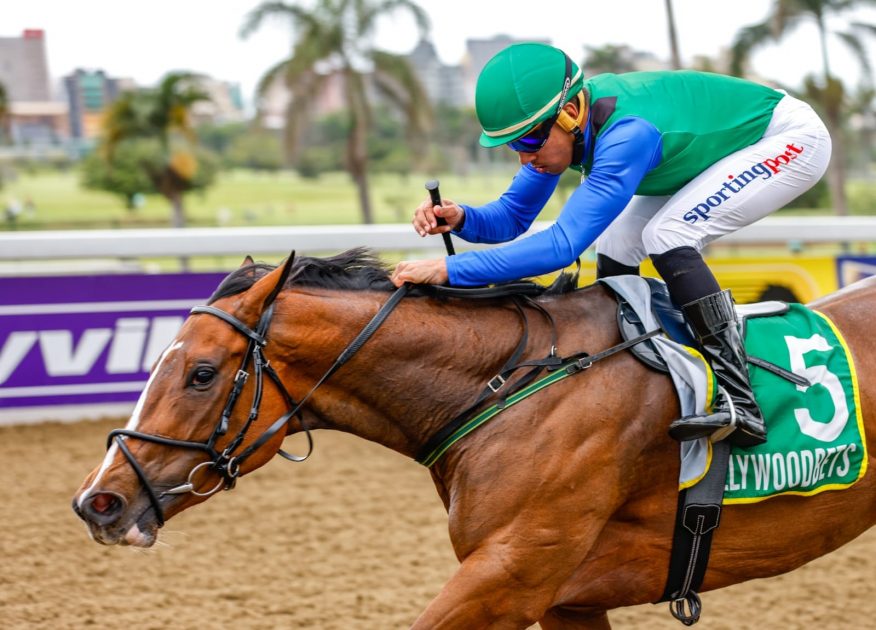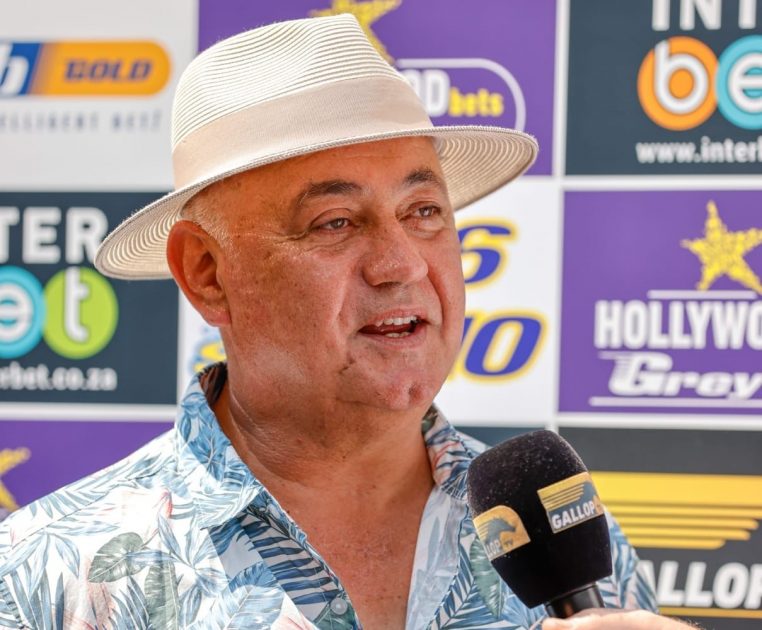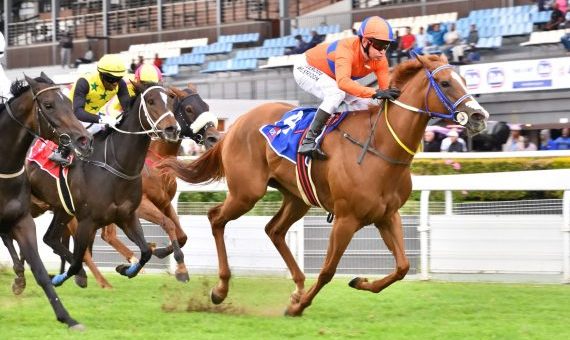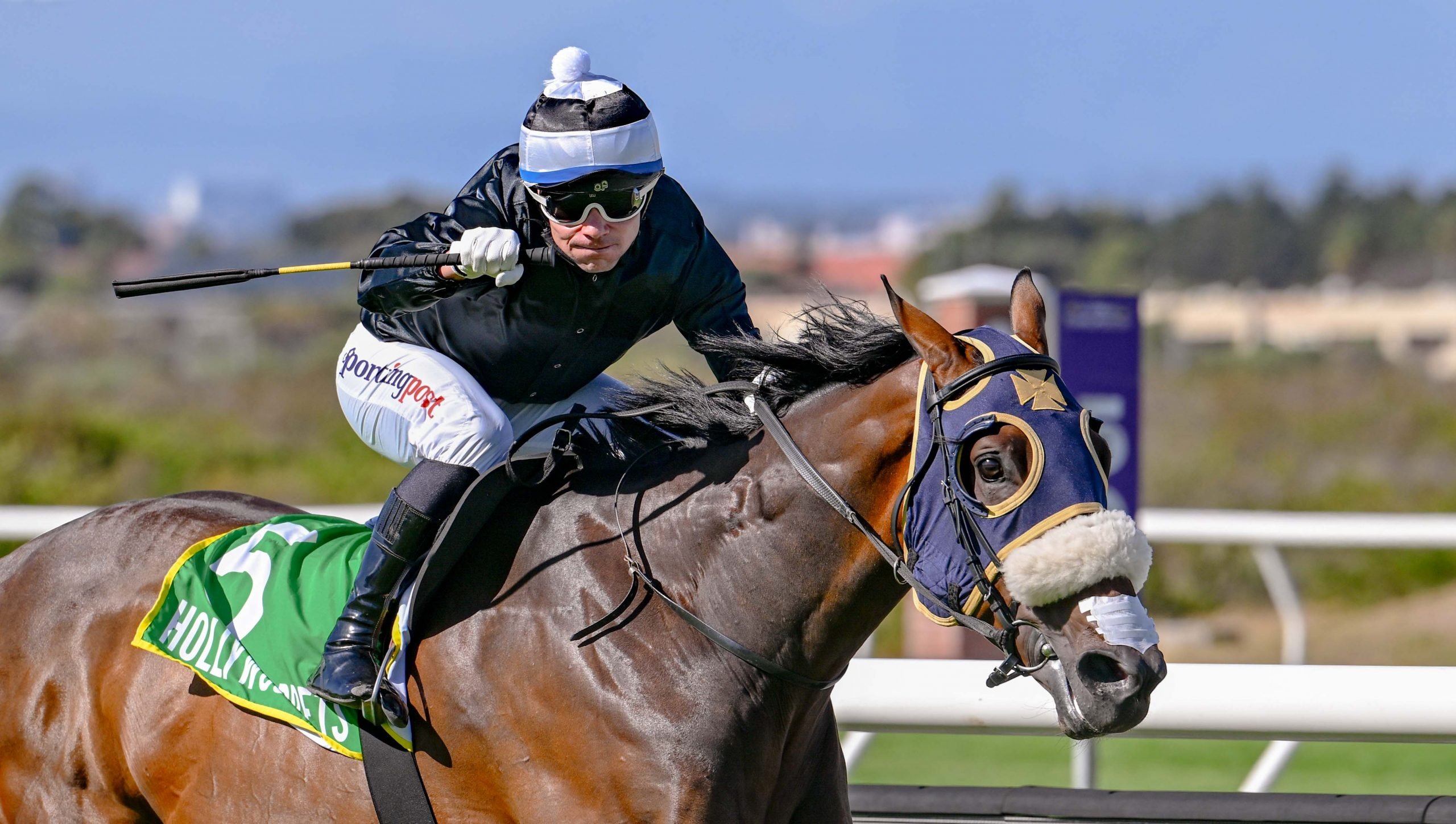There is some irony that in the very week that the National Horseracing Authority called on the media for accuracy, they themselves publish a media release in which they provide the bare minimum of information, and which has now opened the door to speculative wildfire.
That’s the view of legal professional Koos Pieterse who approached the Sporting Post over the weekend to try and provide some context in the Bevie’s Delight debate.
Mr Pieterse is part owner of the 4yo filly, who was recently suspended for a period of 12 months after she was found to be positive for a forbidden substance, Trendione, a steroid.

The promising Bevie’s Delight – seen winning her maiden under Tristan Godden in October 2022 (Pic – Candiese Lenferna)
The Trendione has turned out to be a contaminant, rather than a direct application.
Trainer Peter Muscutt, took responsibility and upon legal advice changed his plea.
He was walloped with an R115 000 fine as the trainer responsible.
Trainer Muscutt confirms Bevie’s Delight had been given Altrenogest though a routine oral administering. He said that he had handed over the Altrenogest that had been used to the NHA.
Muscutt added that the NHA confirmed that that the particular Altrenogest used had been contaminated at manufacture stage i.e. the Trendione was found to be present in it.

Trainer Peter Muscutt – hit with a big fine as the trainer responsible (Pic – Candiese Lenferna)
Subsequent to the two Trendione positives in Australia back in 2017 and 2018, the various racing jurisdictions there had issued warnings for the use of Altrenogest.
All jurisdictions warned against injectable Altrenogest, some of them warned against both injectable and oral administration, and some declared oral Altrenogest may be used up until one clear day before racing.
The reason for these warnings was because when it comes to completely forbidden substances, which in this case is steroids, there is not a permissable threshold.
“The Regumate used by Peter (on fillies only) was handed over to the stipes who had same tested by the NHA. As reported by you in the article, the result showed that the Regumate was contaminated with the steroid found in the specimen taken from the horse. It must be noted and understood that a minuscule amount was traced in the specimen and that at no time was the steroid administered intentionally or knowingly,” adds Mr Pieterse.
He goes on to explain that exactly the same happened months ago in Australia and in other jurisdictions, as mentioned by one of our Sporting Post readers.
“My own research shows that this is well documented and I can provide same on request. At least trainers in those other jurisdictions were warned by the responsible authorities, against possible contamination of Regumate and Allogest. I believe that the NHA only on Saturday 18 November 2023, for the first time, informed all trainers (by email) against this real danger,” continues Mr Pieterse.
(Ed – the warning notice referred to was published on the NHA website on Friday 17 November 2023. It had been read by 10 people up to this morning early.)
Mr Pieterse said that the owners of Bevie’s Delight would like to make their position clear and issued the following statement:
There is NO place for steroids in the sport of racing.
We do not believe that any trainer will intentionally administer same to any horse in training or at any other stage.
In our opinion the penalty for so doing must be an immediate lifelong ban for the trainer. Inter alia, for all the reasons mentioned by Chris Swart in the Sporting Post comment section. We will never trust our horses in the care of any such trainer.
A ban of a year or longer for horses trained, and/or raised on steroids, is more than fair and they should only be allowed to partake in races once they are rehabilitated and clean from any steroids.

Owner Koos Pieterse – following the process and has firm hopes of overturning the suspension (Pic – Candiese Lenferna)
“I hope the aforesaid answers the questions of SP reader Corne Havenga. All the true facts were known to the parties when they had to consider an appropriate sanction and Peter was a first-time offender. Ask yourself – would a trainer who has never been prosecuted for a positive specimen, of any kind, move straight to class 1 steroids that will carry the penalty correctly pointed out by you herein above?”
Mr Pieterse adds that as owners, they are naturally unhappy with the 365-day ban.
“This is unfair on us and the horse who will now be deprived of her opportunity to get the black type she deserves. We believe that she needs to be re-tested by the NHA, at our costs, as soon as possible and when found to be clean, which she will be, for the ban to be lifted. We are in the process of following the correct channels to make this happen and believe that sanity will prevail.”
Ed – This notice was published on the NHA website on Friday 17 November 2023:
NHA analysis of a locally sourced altrenogest-containing product has revealed trace levels of trendione and trenbolone as impurities within the product.
This has been reported previously in international racing jurisdictions. Trendione and trenbolone are anabolic steroids which are forbidden substances and are not allowed to be present in any horse at any time under the NHA Rules of Racing.
mUsSignificant penalties may apply for the person responsible and the horse involved, including a 365 day suspension from racing should these forbidden substances be detected in a specimen collected from a horse at any time.
There are no altrenogest-containing products registered specifically for use in horses in South Africa.
The NHA veterinary department strongly advises trainers against the use of altrenogest-containing products, including compounded products, or those intended for use in other species. Furthermore, it is recommended that all current altrenogest-containing products be removed from all trainers’ yards.
Alternative products such as an injectable, short acting progesterone may be used to suppress oestrus in fillies and mares, which use is provided for in the provisions of the Exempted Substances List (Appendix N of the Rules). Trainers are urged to consult with their private veterinarians.








